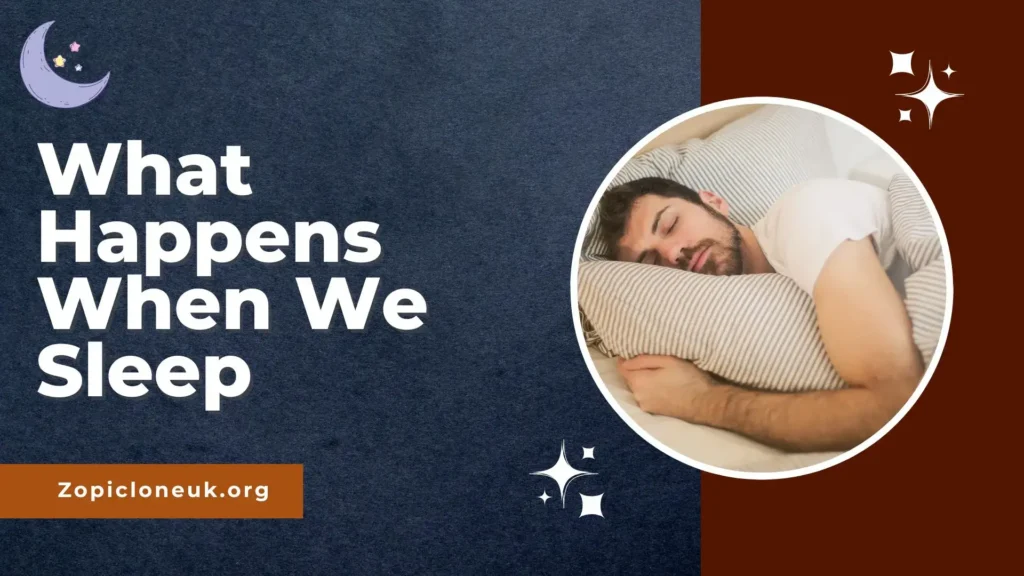
What Happens When We Sleep:- Sleep is an essential aspect of human life, vital for our physical, emotional, and cognitive well-being. It’s during sleep that our bodies repair themselves, process information, and recharge for the day ahead. Yet, the process of sleep is much more complex than just closing our eyes and drifting off. Sleep is divided into five distinct stages, each with its unique function and importance. Understanding these stages can help us appreciate why sleep is so important and how sleep aids our health.
Contents
- 0.1 The Importance of Each Stage
- 0.2 FAQ
- 0.3 1. How long does each sleep stage last?
- 0.4 2. How many sleep cycles should I go through each night?
- 0.5 3. What happens if I don’t get enough REM sleep?
- 0.6 4. Can I skip the deep sleep stages?
- 0.7 5. How does Zopiclone affect sleep stages?
- 0.8 Conclusion
- 1 Author Details
Stage 1: Light Sleep (NREM)
The first stage of sleep is the transition phase between wakefulness and sleep. This light sleep stage lasts for only a few minutes and is characterized by slow eye movements and muscle activity. During this time, the brain produces alpha and theta waves, signaling the body to prepare for deeper sleep.
- Key Functions:
- Slowdown of heart rate
- Relaxation of muscles
- Brief and fragmented dreaming
This stage is essential as it marks the body’s initial steps towards full rest. Any interruption during this phase can easily wake someone up, making it difficult for the body to progress to the deeper sleep stages.

Stage 2: Onset of Sleep (NREM)
Stage 2 is where the body truly begins to rest. During this stage, eye movements stop, and brain waves become slower. Occasional bursts of rapid brain waves, known as sleep spindles, occur during this stage. These are believed to play a role in memory consolidation and learning.
- Key Functions:
- Lowering body temperature
- Decreasing heart rate
- Preparation for deep sleep
This stage accounts for the majority of your total sleep time. Most adults spend about 50% of their sleep in this stage, which serves as a bridge between light sleep and the more restorative deep sleep phases.
Stage 3: Deep Sleep (NREM)
Stage 3 is considered deep sleep, often referred to as “slow-wave sleep” because of the delta brain waves that become more prominent. This is a critical stage for bodily restoration. The muscles relax even further, and it’s difficult to awaken someone in this phase.
- Key Functions:
- Tissue growth and repair
- Energy restoration
- Strengthening the immune system
Deep sleep is especially important for physical health. Growth hormones are released during this time, helping the body repair tissues, regenerate cells, and build bone and muscle.

Stage 4: Very Deep Sleep (NREM)
Often combined with Stage 3 as “deep sleep,” Stage 4 marks the continuation of slow-wave sleep. At this point, delta waves dominate the brain’s activity. While similar to Stage 3, Stage 4 is the deepest and most restorative phase of sleep. It’s during this time that the body undergoes most of its repair and maintenance work.
- Key Functions:
- Rebuilding tissues and bones
- Strengthening the immune system
- Hormonal balance regulation
Stage 4 is where sleepwalking and night terrors can occur. Waking up from this stage can leave you feeling groggy and disoriented, as the body is at its deepest level of rest.
Stage 5: Rapid Eye Movement (REM) Sleep
The final stage of sleep is the REM stage, which is very different from the non-REM stages. During REM sleep, the brain becomes more active, resembling its activity levels during wakefulness. This is the stage where most dreaming occurs, and the eyes move rapidly in different directions (hence the name). The body, however, is paralyzed to prevent any physical reactions to dreams.

- Key Functions:
- Dreaming
- Emotional regulation
- Memory consolidation
REM sleep is critical for cognitive functions like memory, learning, and creativity. It typically occurs about 90 minutes after you first fall asleep, with each REM phase getting longer throughout the night. The brain is processing information, solving problems, and solidifying memories from the day.
The Importance of Each Stage
Each sleep stage serves a purpose in maintaining our overall health and well-being. While deep sleep stages are vital for physical recovery, REM sleep is crucial for mental restoration. If any of these stages are cut short, it can lead to various health issues such as mood swings, difficulty concentrating, and weakened immune function.
Tips for Improving Sleep Quality
- Maintain a Sleep Schedule: Go to bed and wake up at the same time every day, even on weekends.
- Create a Relaxing Bedtime Routine: Engage in calming activities before bed, like reading or taking a warm bath.
- Limit Exposure to Screens: Avoid screens (phones, tablets, TVs) at least an hour before bedtime.
- Watch Your Diet: Avoid heavy meals, caffeine, and alcohol close to bedtime.
- Exercise Regularly: Physical activity during the day can help you fall asleep faster and enjoy deeper sleep.
Extra Tips for Better Sleep
- Limit naps: Although naps can be refreshing, long naps during the day can interfere with nighttime sleep.
- Manage Stress: Practices such as meditation, deep breathing, or yoga can help relax your mind before bed.
- Invest in Comfort: Ensure your sleep environment is conducive to rest. This means a comfortable mattress, soft pillows, and a cool, quiet room.
FAQ
1. How long does each sleep stage last?
The sleep cycle repeats every 90 to 120 minutes, with each stage lasting between 5 to 30 minutes. The deeper the stage, the longer it tends to last.
2. How many sleep cycles should I go through each night?
An average adult should aim for 4-6 sleep cycles per night, which translates to about 7-9 hours of sleep.
3. What happens if I don’t get enough REM sleep?
Lack of REM sleep can result in cognitive difficulties, emotional instability, and difficulty concentrating or processing information.
4. Can I skip the deep sleep stages?
Deep sleep is crucial for physical recovery. Without it, your body won't properly repair tissues or strengthen the immune system, leading to increased fatigue and susceptibility to illness.
5. How does Zopiclone affect sleep stages?
Zopiclone is a sedative prescribed for insomnia. It helps individuals fall asleep faster and stay asleep by acting on specific brain receptors that promote relaxation. However, it may slightly reduce the time spent in REM sleep.
Conclusion
The five stages of sleep—light sleep, deeper NREM stages, and REM sleep—are all essential to overall health and well-being. While light sleep allows your body to prepare for more restful sleep, deep and REM sleep ensure physical recovery, emotional regulation, and cognitive processing. Missing out on any stage, especially deep sleep or REM, can affect how refreshed and alert you feel the next day.
Zopiclone plays a key role in managing insomnia, helping patients reach these essential sleep stages. However, it’s important to understand that while Zopiclone can be effective in treating short-term insomnia, it should always be prescribed by a doctor. Medical professionals can guide you through the appropriate dosage, possible side effects, and long-term treatment options.
If you’re struggling with sleep disorders, a consultation with a healthcare provider is essential to determine the root cause and appropriate treatment plan, whether it involves Zopiclone or other therapeutic measures. It’s crucial to remember that proper sleep hygiene should always be the foundation of a good night’s rest.
Author Details




Medical content by qualified psychiatrists
Our editorial policy

Zopiclone precautions Read our potential abuse notice

Looking for a seller? Locate the best Zopiclone vendor






